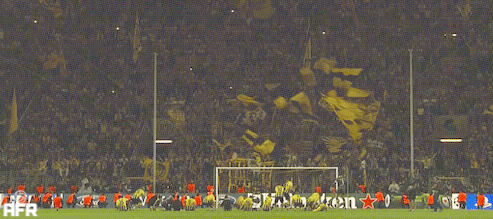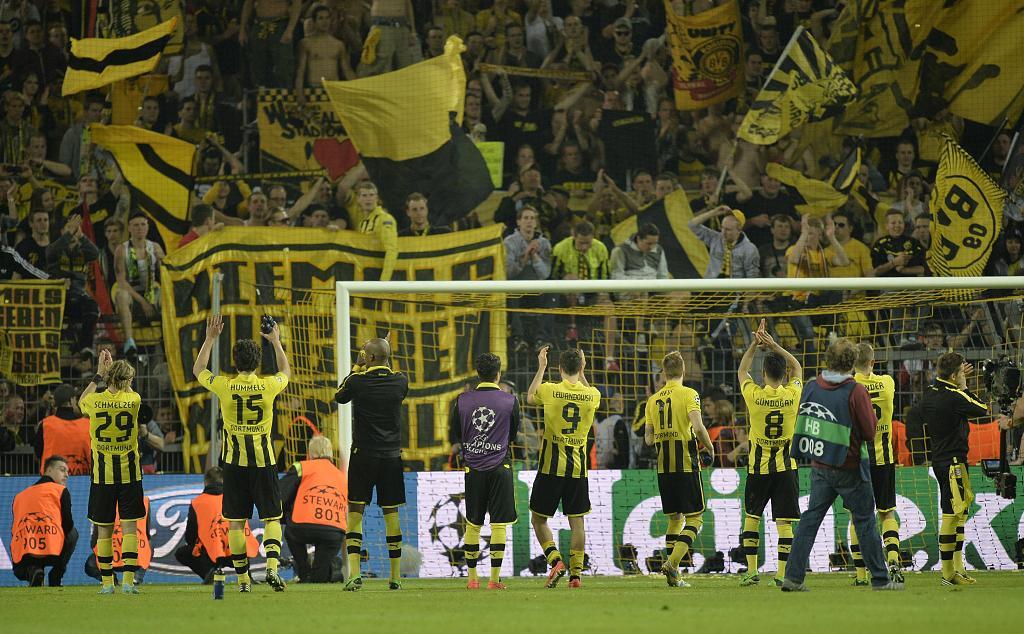Fans as family, not customers, and the rise of Dortmund
Fans as family, not customers, and the rise of Dortmund

Fans as family, not customers, and the rise of Dortmund
They’re made of steely stuff, these people, and a few stories in the tabloids and the press didn’t do much to break their nerves. After all, Dortmund almost went bankrupt in 2005, and even when they lost so much – millions of dollars, sponsorships and players – the fans never died down. That’s not their way. No fewer than 70,000 attended the matches following that close encounter with the death penalty, and now, sometimes for as little as €11 per ticket, they can watch a team that’s looking destined for Wembley and has a chance to win a second Champions League title.
Maybe he was a bit too far away from the action to understand what happened. In five minutes, Borussia Dortmund scored twice against Real Madrid, and Jose Mourinho didn’t know how exactly they did it. The team in yellow played without time to spare, as if they were late for an appointment. When the game started, striker Robert Lewandowski and his teammates charged at Madrid – and scared the wits out of them.
It was almost like an ambush, and after just eight minutes of play Lewandowski scored the first of his four goals. Dortmund used the element of surprise in the second half, too, Lewandowski scoring those two goals that made Mourinho’s head spin. The German club came and went so quickly, and executed the Spanish giant so cleanly. This wasn’t a massacre or a hack job. You couldn’t find any blood on the ground. But there was a carcass, a few shrieks, and a lot of confusion. Mourinho couldn’t explain why immediately after the match. He just knew his team lost, and that they deserved to lose.
Such is the hallmark of Dortmund and modern German football: pace, and lots of it. They play to devastate. One blow follows another before you can even worry about the initial wound, and when Madrid fell to a 4-1 deficit, there was nothing they could really do. And they gave up.
But Dortmund had to push their opponent to that point of surrender. Getting there was not easy. In their own display of swiftness, Madrid struck on the counter attack late in the first half. Defender Mats Hummels tried to pass the ball back to his goalkeeper, Roman Weidenfeller, but fluffed the attempt. Gonzalo Higuain latched on to the ball, and Cristiano Ronaldo tapped in the easy pass. Ronaldo’s equalizer, at 1-1, hushed the crowd, and suddenly the momentum had swayed like a tree in gusty winds.
But the Germans didn’t let Madrid run away with the game. It’s a remarkable trait of this Dortmund team: the power to overcome and persevere. They did against Malaga in the closing minutes of their Champions League quarter-final, turning a 2-1 loss into a 3-2 win and somehow getting their hands on a ticket to this stage of the competition.
They also performed so well in this week of distractions and internal struggle, a week in which the impending departure of Mario Gotze was announced at the worst possible time. There were still meaningful games to play, and there was so much at stake. Gotze, the 20-year-old midfield maestro who’s been with the club since he was nine, didn’t do too much to impress or stand out, but he also escaped the wrath of 80,000 boos. The fans gave him and his team full support, as they have always done in times of uncertainty.
They are proud of what they are seeing. And what they are seeing is, of course, the culmination of many things.
At the turn of the century, Dortmund played a risky game. They put themselves on the stock market, where they did make almost €143-million. They even sold the rights to their stadium. After winning Europe’s top prize in 1997, they were addicted to the success – at all costs. They were enamoured with the Champions League, the prestige, everything. Much like Leeds United, Dortmund spent money and took out loans to compete with the big boys, but the play on the field didn’t match the dollars that went with it.
In the first years of the new millennium, Dortmund lost their soul, lost their home and lost their way. And it took a few more seasons to right those wrongs. So you can understand just how chiselled this community is. They could’ve sold everything else. They could’ve left their team in the hands of sound and stable investors. But the team is once again owned by their supporters, one of 33 German clubs to do so. Unlike Cardiff City – whose owner, Malaysian businessman Vincent Tan, changed the team’s iconic blue colours to a more marketable red before they clinched promotion to the ever-profitable Premier League – Dortmund have been successful without losing the club’s spirit. They are still working-class, still and always playing in black and yellow.
“The German fan wants to have the feeling that he is a part of the whole,” Dortmund’s chief executive, Hans-Joachim Watzke, tells FourFourTwo magazine. “In England, the fan is now basically a customer and can, by and large, live with that. But if you tell a German supporter that he is just a customer, he’s going to kill you.”
Dortmund have won the Bundesliga twice in the past three years and beaten Madrid so definitively on the back of kids in their twenties and on a payroll of just €80-million – roughly the cost of Aston Villa, a squad sitting precariously above the relegation zone in England. Fifteen Germans started in these semi-finals this week, and seven of them belong to Dortmund. “Of 525 players in the Bundesliga,” writes David Conn in The Guardian, “60% are German, and the average age of the players is 24.”
This club has worked hard to be legitimate and true and real – the Bundesliga, too, has spent around €700-million on youth academies alone – but the way in which Dortmund escaped the spectre of debt and came to thrive without the aid of an oligarch is extraordinary. These people in the area of Ruhr, where Borussia play, are not weak. They have fought for the right to stand and cheer – quite literally. (Several security measures threaten to prohibit the masses from standing in the south end of the stadium, the famed Yellow Wall. They stood silent in protest during one match.) They have not let their club rot and die. And they will not break when Gotze leaves, and when, if reports suggest the truth, Lewandowski follows him on the way to Bayern Munich.
Dortmund’s manager, Jurgen Klopp, is a man that’s harnessed these boys and turned them into men, the “monsters of mentality,” as he calls them, that they are. “This has been another season in which they had to face new challenges. Often – not always, but often – they have dealt with them remarkably,” Klopp says in FourFourTwo. “Because having talent is one thing, but much more important is what you do with it.”
It’s the effort that counts most. And against Real Madrid, you didn’t see so many tricks and flicks, but little bursts of speed, short sprints, and lots of quick passing. Unlike Barcelona, they don’t like to wait and ponder and debate their next move. They push forward, and now they’ve made dust out of everyone. They haven’t lost a game in the Champions League in 16 months.
Klopp is a major reason why. He’s got a smile on his face that sucks you in. He’s eccentric and infectious, and he’s not afraid to roar or curse on the field. He works for the players and they work for him. He wants his players to run, and so they run. That’s all, really. And because of Dortmund’s relentless work ethic, they play as if they have another man on the field. They are successful because they want to be. Desire can go a long way.
They, too, found a way out of Bayern Munich’s shadow. The Bavarians scored four goals of their own against Barcelona the evening before. In many ways, they are so much bigger than Dortmund: they enjoy twice the amount of Dortmund’s revenue and they pay their players doubly so. They are threatening to pick apart a team in Dortmund ripe with budding talent. Where Bayern Munich may thrive Dortmund may not.
Yet, there is something so industrious about Borussia – they have scored 110 times, and still play with discipline, not reckless abandon. Now there’s a chance to confront the bully who wants to steal their players, who owns all the money, who stole the German title. Dortmund lost to Bayern Munich in the German Super Cup, in the domestic cup, and the league. But maybe the joke’s on them. Give Dortmund the chance to persevere and they will do exactly that.
This piece was written by Anthony Lopopolo, a regular contributor to AFR and a resident European football expert. You can follow Anthony on Twitter at @sportscaddy. Comments below please.









